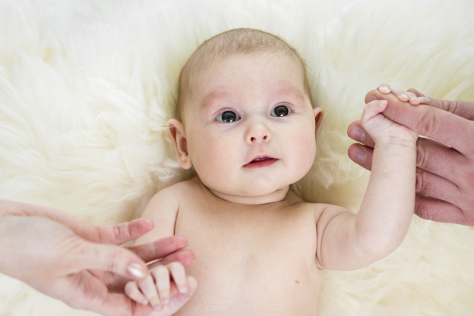Understanding the ‘Wonder Weeks’ of baby sleep
Figuring out why your baby’s sleep can be unpredictable can help you cope with what is to come

The ‘Wonder Weeks’ is a term coined by Dutch doctors, husband and wife team, Frans Plooij Ph. D. and Hetty van de Rijt Ph. D. They talk about the 10 wonder weeks of sleep that all babies go through between birth and reaching about 20 months old.
It’s possible that their explanations of when and why you can experience changes in your baby’s sleep can help you to cope, or at least tolerate it better, with the lack of sleep you experience as a result. Understanding the reasons your baby's sleep may have regressed in sleep can help you soldier on and console yourself with the fact that it really won’t be like this forever.
Here’s a rundown of what you might expect and when.
5 Weeks - Changing sensations
Your baby is becoming more alert and more aware of the surroundings. This is often when the so called ‘witching hour’ usually starts – when your baby appears more unsettled between around 5-10pm. Your baby is likely to be going through a growth spurt at this point too. Cuddle and comfort your baby lots to help them through this phase.
8-9 Weeks - Patterns
Your baby is starting to practice moving hands in the same way over and over, or make the same noise over and over. With all this going on and keeping baby alert, it can make it harder for them to settle and fall off to sleep, so help by creating calming sleep associations at bedtime and nap times.
12 Weeks - Smooth transitions
By this age your baby’s movements become smoother and more gently coordinated. They are aware of more around them, such as parents leaving the room. Your baby is becoming more active – and that can affect their sleep. However, some parents may notice that their baby soon settles into a longer sleep each night as a result of this stage.
15-19 Weeks - events
By now your baby is learning cause and effect, for example, if they drop a toy, someone will bend down to pick it up, they may also be approaching another growth spurt. This is the first stage babies can experience sleep regression. Even if baby’s sleep was predictable to this stage, it may all start to change now. This may be a good time to see if your baby may have any sleep associations that may help them to start thinking it is bedtime, it may be a favourite cuddly toy, blanket, muslin or music. Crawling is their way of exploring the big wide world.
23-26 Weeks - Relationships
Another growth spurt is common around now. Distance is now recognisable to your baby. Some babies begin to experience separation anxiety and this can be challenging at nap time or bedtime. By now you may want to encourage your baby to sleep more independently without relying on you needing to rock, pat or shush your baby in order to settle. You can do this by leaving the room after you’ve said goodnight, but wait outside and checking on your baby at intervals. Or if you prefer a softer approach, sit next to your baby’s cot and progressively move further away over a period of a few nights.
33-37 Weeks – Categories
Those growth spurts arrive again and your baby is learning crawling and starting to pull themselves up to standing. Some babies may even begin to stand and take assisted steps. It’s common therefore for babies sleep to get quite disrupted now. Plus, this is often when babies start to test out if crying will get mum or dad to come back to them. At this stage to try and avoid your baby getting into any new sleep association.
42-46 Weeks - Sequences
Simple tasks like getting dressed can be an opportunity to chat and get your baby more involved in as most babies love knowing what’s happening and coming next - so telling your baby what is coming next can help you through this phase. Some babies go through a brief 12 month sleep regression around now.
52-55 Weeks- Programs
Your toddler is getting to grips with finishing a task. This is also when most toddlers start showing strong preferences like they only like square sandwiches and not triangles. Separation anxiety can also return so toddlers might begin to resist naps and bedtime.
61-64 Weeks- Principles
Learning that actions have consequences can begin to happen for your toddler around now. You’ll be learning fast how you respond to their actions, so it’s a good time to start thinking about how you want to approach saying ‘no’ and deciding on consequences. This is certainly the case for sticking to firm principles at bedtime.
72-76 Weeks - Systems
You may notice that your toddler starts to change behaviour and actions to suit different situations which is often why the nursery may tell you they’ve been an angel but you’re finding them challenging at home. Resisting sleep at this stage is common, so stay strong and keep to bath, bed and book at a consistent time to help ensure a good night’s sleep for everyone.
The Wonder Weeks book is popular with many parents but here's why you should take the advice with a pinch of salt...
- There isn’t enough evidence to back the theory up, there's a lack of observational trials on human babies as opposed to chimps.
- Other research looked for evidence of the so-called “leaps” in infants, as discussed in the Wonder Weeks, and found none.
-
The research doesn’t take risk factors (such as premature babies, babies born with low birthweight and other genetic information) into consideration.